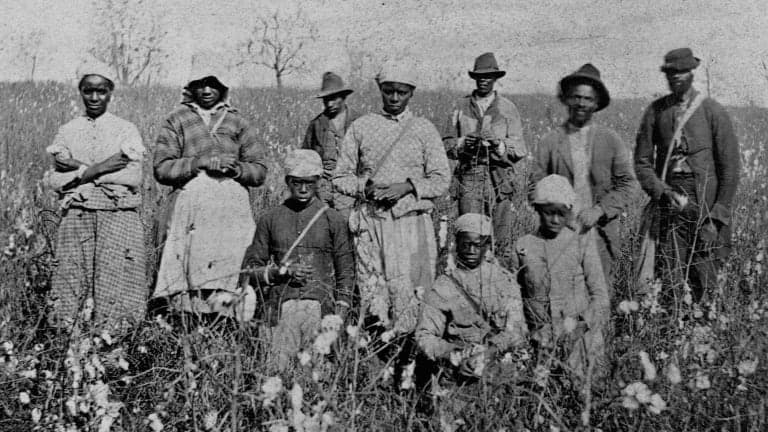Introduction
The American Civil War resolved 2 important questions that had not been addressed by the Founding Fathers:
- the question of sovereignty and the place of the States in the Union
- the question derived from the conflict about the constitutional protection of slavery
With the collapse of the Confederacy, the Government confronted the difficult issue related to the readmission of the seceding States and the citizenship of former slaves.
A new phase
On April 13th, 1865, President Lincoln and his wife went to Ford Theater in Washington to see the play called Our American Cousin.
At 10:30, the president was shot in the back in the dark. A man, named Booth, jumped onto the stage and shouted “Sic semper tyrannis“. He was captured a few days later. Lincoln died the following day.
Lincoln was succeeded by his vice-president Andrew Johnson. The biggest problem Johnson faced was how to deal with the defeated South.
A few weeks before, Lincoln had asked the Americans to “bind up the nation’s wounds” and rebuild their homeland.
Lincoln blamed individual Southern leaders for the war, rather than the people of the seceding states. He intended to punish only these guilty individuals and leave the rest of the South’s people alone.
Johnson introduced plans to reunite the nation. As soon as the leaders of the South were loyal to the US government, they could elect new state assemblies to run their states.
When they were made to accept the 13th Amendment, Johnson reintegrated them into the Union. Some Southerners tried to resist any changes that threatened their way of life. They were scared to give rights to their former slaves.
The assembly of Mississippi even said: “To be free however doesn’t make a negro a citizen or entitle him to social or political equality with the white men”.
All their assemblies voted on laws to keep blacks in inferior conditions. These laws were called the Black Codes.
The ruling whites intended the blacks to remain unskilled, uneducated, and landless with no legal protection or rights of their own.
The Black Codes refused them the vote, said they could not vote on juries and forbade them to give evidence in court against white men.
In Mississippi, blacks were not allowed to buy or rent farmland. As a result, it was as if blacks were still slaves.
A growing anger…
Set place in the North about the Black Codes. As usual, this conflict will bring about extremist positions.
In Congress, the Radical Republicans believed that the most important reason for fighting the Civil War was to free the blacks. They were determined that neither they nor the blacks were going to be cheated.
They said Johnson was treating Southerners too kindly and that they were taking advantage of it: “They have not been punished as they deserved“.
In July 1866, despite the President’s position, Congress passed a Civil Rights Act and set up an organization, the Freedmen’s Bureau. Both these measures were intended to ensure blacks were not cheated of their rights.
Moreover, the introduction of the 14th Amendment gave blacks full rights of citizenship, including the right to vote. All the former Confederate States except Tennessee refused to accept it.
In March 1867, Congress passed the Reconstruction Act, dismissed the white Governments of the South, and placed them under military rule.
By 1870, all southern states had new “reconstruction governments“. Most of them were made up of blacks, a few white Southerners, and white men from the North.
The newly arrived Northerners were referred to as “carpetbaggers” by the Southerners opposing them. Any white Southerner who cooperated with the carpetbaggers were referred to with much contempt as “scalawags“.
Most white southerners supported the Democratic Party. These southern Democrats claimed that the reconstruction governments were incompetent and dishonest.
There was some truth in this claim. Many of the new black members in the assembly were inexperienced and poorly educated (and many carpetbaggers were thieves).
But reconstruction governments also contained honest men who tried to improve the South. They passed laws to take care of orphans and the blind, to encourage new industries and the building of the railroad, and to build schools for both black and white children.
Yet, none of these improvements stopped white southerners from hating reconstruction governments just because they aimed to give blacks the same rights that whites had.
Some of them were determined to prevent this: they organized terrorist groups to make the white men the masters once more. The aim was to threaten and frighten black people.
The most feared terrorist group was a secret society called Ku Klux Klan (KKK). Its members dressed in white sheets and hoods to mask their faces. They rode by night through the countryside killing the Blacks who were trying to improve their position.
Their symbol was the burning wooden cross placed outside the homes of their victims. This use of violence and fear helped white racists to win back the Governments of the South.
The final failure
By 1876, republican supporters of reconstruction governments won only 3 states.
In 1877, when Congress withdrew the troops from the South, white Democrats won control too. 1877 marked the failure of the reconstruction governments for the North.
From this time onwards, southern blacks were treated more and more like second-class citizens. Most seriously, they were robbed of their right to vote.
Some southern States prevented them from voting by saying that only people paying a poll tax could vote. They made the tax so high that the blacks could not afford to pay. Some blacks tried to pay but the tax collector refused their money.
Besides, “Grandfather Clauses” were used to prevent blacks from voting. These clauses allowed the vote only to people whose grandfather had been allowed to vote in 1865 and most blacks had got the right to vote a year later, in 1866. It took away their right to vote.
In Louisiana for instance, there were 164 088 white voters and 130 444 black voters before 1898. After Louisiana introduced the “grandfather clauses”, there were 125 437 white voters and only 5 320 black voters.
Once blacks lost the vote, taking away their other rights was easy. Strict racial segregation was enforced on trains, in parks, in schools, in restaurants, and even in cemeteries.
Any black who dared to break these laws was likely to end up in prison or worse. In the 1890s, there was an average of 150 blacks killed illegally and lynched.
Conclusion
The Civil War and the Reconstruction were lost but the Reconstruction had not been for nothing. It was the boldest attempt to achieve racial justice in the United States.
Furthermore, the 14th Amendment is especially important because it was the foundation of the Civil Rights movement and it made it possible for Martin Luther King to protest on behalf of all black Americans.
Synopsis » From the Puritan settlements to the American Civil War (1787-1877)
- Antebellum South
- Introduction to Puritanism and Expansionism
- Life in the Plantations
- USA: North and South
- O’Sullivan’s Manifest Destiny
- The social context of America in the early 19th century
- The American Civil War: 1861-1865
- America: The New Nation
- After the American Civil War: The Reconstruction
- America: West to the Pacific
- Years of Growth

